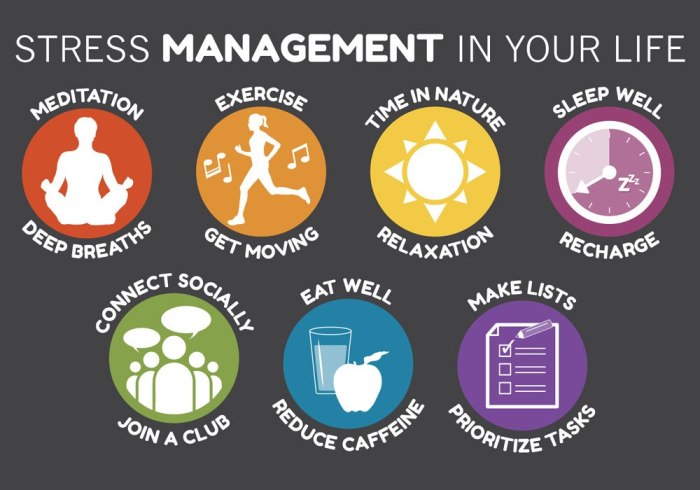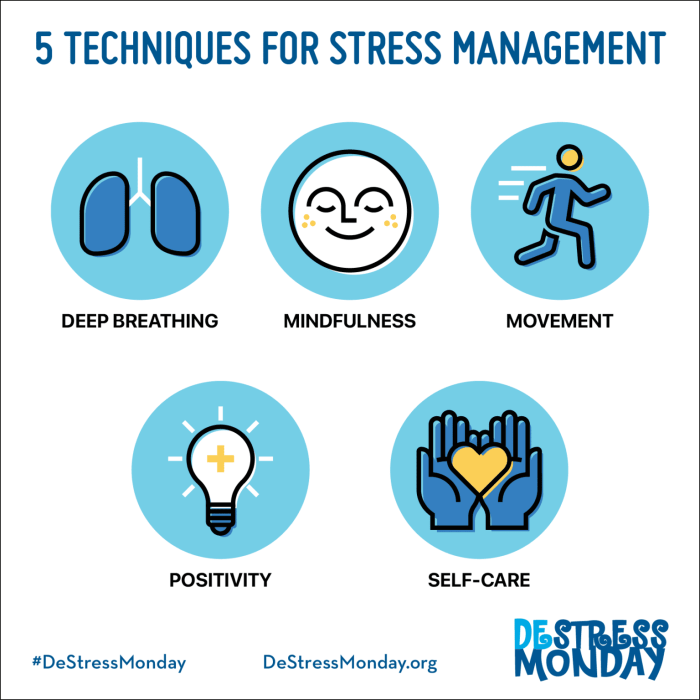Stress Management Tips takes center stage with a fresh twist on handling life’s pressures, offering a cool blend of wisdom and practical advice that resonates with high school hip vibes.
Get ready to dive into the world of stress management like never before, where wellness meets style in a way that’s totally rad.
Overview of Stress Management
Stress is a natural response to challenging situations that can have both mental and physical effects on our health. It can manifest in various forms such as anxiety, irritability, or even physical symptoms like headaches and muscle tension. Managing stress is crucial for overall well-being as chronic stress can lead to serious health issues like heart disease, depression, and weakened immune system.
The Impact of Stress on Mental and Physical Health
Stress can negatively affect our mental health by causing feelings of overwhelm, anxiety, and even leading to conditions like depression. On a physical level, stress can weaken the immune system, increase blood pressure, and contribute to the development of chronic diseases.
Importance of Stress Management
Effective stress management techniques can help reduce the negative impact of stress on our bodies and minds. By learning how to cope with stress in a healthy way, individuals can improve their overall quality of life and prevent long-term health consequences.
Prevalence of Stress in Modern Society
Studies have shown that stress is a common experience in modern society, with a large percentage of individuals reporting feeling stressed on a regular basis. Factors such as work pressure, financial concerns, and social expectations can all contribute to the high levels of stress experienced by many people today.
Identifying Stress Triggers

Identifying stress triggers is essential for effective stress management. By recognizing common stressors and understanding how they affect you, you can take proactive steps to reduce their impact on your well-being.
Common Stress Triggers
- Work Pressure: Tight deadlines, demanding bosses, and overwhelming workloads can all contribute to stress.
- Relationship Issues: Conflicts with family members, friends, or romantic partners can be a significant source of stress.
- Financial Concerns: Struggling with money, debt, or financial instability can cause a great deal of stress.
Recognizing Personal Stressors
Self-reflection and awareness are key to identifying your personal stress triggers. Pay attention to your thoughts, emotions, and behaviors to pinpoint what situations or experiences lead to stress for you.
Signs of Stress
- Physical Signs: Headaches, muscle tension, fatigue, and changes in appetite or sleep patterns.
- Emotional Signs: Irritability, anxiety, sadness, feeling overwhelmed, or a sense of constant worry.
- Behavioral Signs: Procrastination, increased use of substances like alcohol or tobacco, social withdrawal, or changes in activity levels.
Healthy Coping Mechanisms
In times of stress, it is crucial to have healthy coping mechanisms in place to help manage and alleviate the pressure. By incorporating activities like exercise, mindfulness, and hobbies into your routine, you can effectively combat stress and improve your overall well-being.
Exercise, Stress Management Tips
Regular physical activity has been shown to reduce stress levels by releasing endorphins, the body’s natural mood lifters. Whether it’s going for a run, attending a yoga class, or simply taking a brisk walk, exercise can help clear your mind and boost your mental health.
Mindfulness
Practicing mindfulness techniques, such as deep breathing, meditation, or yoga, can help you stay present and focused, reducing anxiety and stress. By incorporating these practices into your daily routine, you can cultivate a sense of calm and inner peace.
Hobbies
Engaging in hobbies that bring you joy and fulfillment can be a great way to unwind and de-stress. Whether it’s painting, gardening, playing music, or cooking, finding activities that you enjoy can provide a much-needed break from the pressures of daily life.
Time Management and Prioritization: Stress Management Tips

Effective time management plays a crucial role in reducing stress levels by helping individuals organize their tasks efficiently and preventing last-minute rush and procrastination.
Setting Priorities
- Make a to-do list: Write down all tasks and prioritize them based on deadlines and importance.
- Use the ABCDE method: Assign priorities ranging from A (most important) to E (least important) to each task.
- Focus on high-value tasks: Identify tasks that contribute most to your goals and tackle them first.
Work-Life Balance
- Set boundaries: Establish clear boundaries between work and personal time to avoid burnout.
- Take breaks: Schedule short breaks throughout the day to recharge and maintain productivity.
- Prioritize self-care: Make time for activities that promote relaxation and well-being, such as exercise, hobbies, and socializing.
